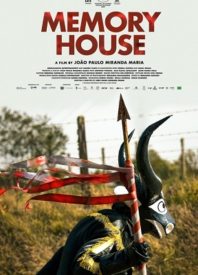
Probably the most on brand moment a director has ever had comes from Gaspar Noe’s Criterion Closet Video. In it, the provocateur makes careful sure to talk about the influence Pier Paolo Pasolini’s Salo had upon him, noting that his mother took him to see the film several times as a youth. Knowing this, it’s not a surprise that Noe’s work takes on such a dark and nihilistically hellish tone. If, in your opinion, the defining work of cinema is something inherently about the darkness of humanity, then you’re probably making Irreversible at some point in your life.
For Joāo Paolo Miranda Maria, Memory House is less aggressive than Noe’s work, but it too starts from a negative position. The film centers around the elder Cristovam (Antonio Pitanga). He’s an older Black man who works at an industrial dairy farm. Cristovam routinely experiences discrimination at the hands of both the community and the other employees. One of the first scenes in the film, features management calling Cristovam on the carpet, imploring him to work harder…or else. In doing so, they flat out state in front of his face that he will have nowhere to go. That’s due to the combination of his age and race.
This is the world of Memory House, which seems to be mostly commentary. Certainly, Miranda Maria didn’t mean it to come off as lighthearted. Brazil has long had issues with systemic racism (this is the thesis of Mendonça Filho’s Neighbouring Sounds), but it’s arguably worse as populist leader Jair Bolsonaro roared into power on the back of a platform that was extremely far-right leaning. Thus, Miranda Maria’s film aims to be timely in nature. It aims to deconstruct a very precarious time in Brazil.
Mostly, this manifests itself in how other characters treat Cristovam. People break into his house and scrawl racial epithets on his walls. And as Cristovam faces more and more discrimination, he begins to identify with the cows that he minds at work. This leads to some very striking imagery, particularly as Miranda Maria leands into folkloric elements. I always appreciate films that have this certain feeling. It’s as if the director is extremely conscious of what the intended effect of these shots have on the audience.
But the larger issue with Memory House is that it holds its cards far too close to its chest, preferring to choose violence over commentary. The film is glacially slow, even for arthouse trappings. And while the film’s final frames may suggest hope, the preceding eighty-six some odd minutes are nothing but bleak.
- Release Date: 9/3/2021

